HIT CHANNEL EXCLUSIVE INTERVIEW: April 2016. We had the great honour to talk with a legendary electric bass player: Jeff Berlin. He has released many solo albums and has also played with Bill Bruford , Bill Evans, Frank Zappa, John McLaughlin, Allan Holdsworth, Eddie Van Halen, Larry Coryell , Patrick Moraz , Anderson Bruford Wakeman Howe (ABWH), Scott Henderson, Dennis Chambers and others. He is currently working on “Jack Songs: An All-Star Tribute to Jack Bruce”. Read below the very interesting things he told us:
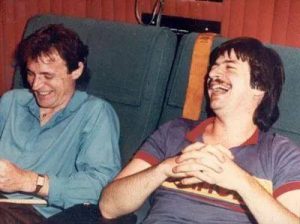 Why you decided to record “Jack Songs: An All-Star Tribute to Jack Bruce”?
Why you decided to record “Jack Songs: An All-Star Tribute to Jack Bruce”?
I decided to do it because Jack is a hero to me. He is the only bass hero that I ever really had. He is the only bass player who emotionally impacted on me greatly. I was not only in love with what he played, I was in awe of what he played and this was during my formative years. So, I started a program with the great American producer John McCracken at http://www.pledgemusic.com/projects/jeffberlinplaysjackbruce . It’s the website where we invited people who love Jack Bruce, who may like what I do and who like the drummer we have, Chad Smith from the Red Hot Chili Peppers. We have Neal Schon (Journey, Santana) on guitar, Allan Holdsworth, Paul Schaffer on organ. We have a lot of great musicians with the Pledge thing. It’s a new day in music. It’s better recording the record and selling it. We have people who invest in the record by buying the CD ahead and then they get it when the record is finished. That’s how Robert Trujillo (Metallica –bass) financed the “Jaco” movie. He went to Pledge Music and he said: “Hi people, would you please send us money and move to make this movie?” And that’s exactly what I am doing and I made a brief statement saying: “Hello, come and pledge money and do this. What you are doing is that you are financing our record and then we will send you the record once it is finished”.
Who will be the guest musicians on “Jack Songs: An All-Star Tribute to Jack Bruce”?
We have a lot of players. Geddy Lee (Rush –bass/vocals/keyboards) said he could sing, not right now, but later because Rush broke up. So, he was depressed about Rush breaking up and I said: “Come sing with me” and then, you know, he’ll have some music but he said: “Give me a little time to recover” because he was very upset about Rush breaking up. I have a lot of good musicians and some of them do not want to have their name mentioned until the recording starts. I have Chad Smith, who is the drummer from the Red Hot Chili Peppers; Allan Holdsworth, who’ll play guitar for me. We have a bunch of guys. There is a guitarist who I can’t mention his name. He said: “Don’t mention my name until the recording starts”. I have good singers but right now both of these guys do not want their names mentioned and I have to respect their wishes about that.
What is the release date of “Jack Songs: An All-Star Tribute to Jack Bruce”?
We are thinking October 2016.
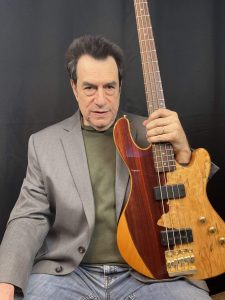 What are the other projects you are currently involved in?
What are the other projects you are currently involved in?
Right now I am writing a book about bass education and I am teaching. So, while I am involved with the “Jack” project, I am staying at home teaching bass and doing clinic when I get offers for clinics, but I am not touring right now. When people call me to record or tour, I do those jobs, but right now my main focus is on writing this book and I have clinic tours for Cort Guitars.
“Low Standards” (2013) is your latest solo album. What is different in “Low Standards” compared with your previous albums?
“Low Standards” is my favourite trio record that I have ever recorded. I think the songs are great. I think the recording is great. It’s different because it’s the next step in growing as a musician. I like to grow as a bass player. I play very different. That album represents that period of my life as a bass player and I’m very happy with it. It’s more modern for me than my other records and this new Jack Bruce record will be more modern than that. And then after the Jack Bruce record whatever I do next, will have a new approach to bass. I like growing as a bass player, I like to change as a musician.
What is your philosophy of teaching bass?
My philosophy is that there has always been a way to learn music, that has existed in the world for over 500 years. It’s the only way that everybody has to learn. The only way. And that was a teacher who will instill, will teach music to his students. Other than being self-taught or jamming or playing listening to CD the modern way, the only way that everybody, on every instrument, anywhere on earth, is going to a teacher for to learn music. Bass education to me has gone away from the method of learning that 100% guarantees that every student can learn how to play better. At least in America, bass teachers have modernize bass education, but bass education is not mean to be modernized.
The main reason when you go to a teacher is to learn what music is and how to practice it. Because if I want to learn Greek, I have to learn the words. If you want to learn English, you have to learn the words. It’s a very simple concept. The bass players have been taught incorrectly that groove should be taught. I can prove this with statistics: Look at every famous player, on every instrument, in any style, and maybe not one of them ever went to school for learn how to groove. The reason I mention it is because groove is the #1 concern with bass players, when they don’t have to be concerned. It’s not a major point of concern. It’s not a problem. It will never be a problem with groove. That’s why bass players don’t know how to play. What I think to and what I developed and it was hard to learn it, is that I can make anyone’s playing better if they just practice the work that I give them . And the work that I would give them it’s not hard and not crazy, it just requires time. When I make this kind of statement, usually many bass players don’t study with me, because this means that they really have to practice to get better. You cannot play better without learning how to play right in your instrument, which is music, and figuring it out on the instrument. That’s what I do and that’s why 100% of my students learn how to play better and what they learn, they learn it for the rest of their lives.
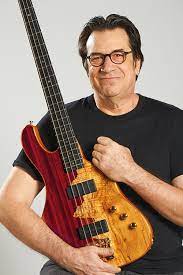 How emotional is to play “Tears in Heaven” (Eric Clapton) live? It’s a great cover.
How emotional is to play “Tears in Heaven” (Eric Clapton) live? It’s a great cover.
Oh, thank you. Yes, I love that song. Well, I am always emotionally happy when I play the bass in all areas. So, “Tears in Heaven” is equally important to me as playing a solo or just playing a simple bass chord. So, playing is emotional. “Tears in Heaven” was my way of finding a way to play the bass specially. I am one of the first bass soloists who played alone. Jaco did “Portrait of Tracy” and then I followed that and I began to do several records with several bass solo pieces. I am one of the only real bass soloists in this manner. So, my emotion is when I create something special on the bass guitar. That makes me very happy and it’s an honour for me when I find good music to play. “Tears in Heaven” is just one time, but I found something special.
Was it a life-changing experience to play with Bill Bruford ?
Yes, that’s exactly what it was, Theo. It was life-changing. Bill Bruford taught me things I didn’t know and opened up my career to the world. So, I am very grateful to do. I admire him. He’s a smart, motivated and musically gifted musician. Yes, it was one of the greatest musical experiences I had, to play with Bill Bruford.
Can you tell us a few words about your friendship with Rush?
Well, when I was with Bill Bruford, Rush was a young band and they were interested in the modern playing, that was a part of what was called “fusion”. So, when we used to play and Rush were around, they would come and see us playing and they became fans of our band. I am a fan of Rush, I think they are one of the best bands ever. We met these three guys, they met me and I met them and we became friends. It’s nice to have a friendship with the musicians you admire. Geddy Lee and I, became very close friends. I jammed with Rush in the soundcheck: They invited me to their soundcheck, and Geddy was playing the keyboards and his roadie gave me his bass guitar. So, for 5 minutes Rush was a quartet. That was fun.
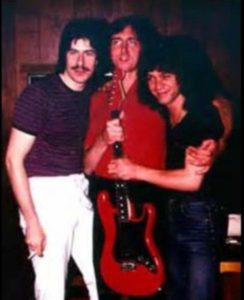 Do you have happy memories of the night you and Eddie Van Halen joined Allan Holdsworth on stage at the Roxy in L.A (29 April 1982)?
Do you have happy memories of the night you and Eddie Van Halen joined Allan Holdsworth on stage at the Roxy in L.A (29 April 1982)?
Yes, because Eddie Van Halen is a master guitar player. He is as great as a rock guitar player as John Coltrane is great as a jazz saxophonist. And he’s an innovator. And Allan Holdsworth is an innovator. I managed to play with both of these guys and it’s a great honour. I enjoyed the time that Eddie and I, used to hang out in L.A and certainly hanging with Allan and playing with him as well.
Why you turned down an offer to join Van Halen?
Because of lifestyle. What happened was: These guys were into a life philosophy that I was not into. That’s all I can say about it. They were involved in a philosophy of life and in activities, that I was not involved in. I thought it was bad to join the group. I didn’t wish to simply join their band. I didn’t want to just join their band and take their money. Because Van Halen to Alex, Eddie and David weren’t just a group, it was a family and a life. It was a life philosophy, it was a musical enclave of guys where the band was more important to them than anything in their lives, except of course their families. So, when I was offered the gig, I could smile and say: “Yes, I would love to play”, to make some money and then leave the band. I thought that would be disrespectful to the Van Halen, so I didn’t do that.
Is there still room for experimentation in jazz music?
Yes, there is. There is always room for experimentation. I am not sure everybody will enjoy it, because it takes a certain kind of love for music, to be appeared as experimental music. Experimenting for me, means not to change music completely but to play differently within it. So, I happen to like rock, swing and jazz and my experimentation would be based on the notes that I choose. That’s more experimental. I have never been interested with coming up with new things, just to come up with new things. I am actually not that talented to do it. I can’t do it. But I certainly listen to the music that I feel I want to play inside of me and then I try to represent it.
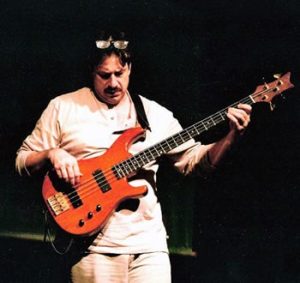 Why did you send a letter to Barack Obama?
Why did you send a letter to Barack Obama?
(Laughs) I sent a letter to Barrack Obama when I saw a performance on television of presenting the arts at the White House. It was a White House concert and when I saw the concert, the artists were the typical famous artists. It was Paul Simon, it was Steve Wonder who sang “Superstition”. It was a list of guys that are already established, already world famous and I thought it did not promote music, but promoted music entertainment. So, I wrote a letter and I sent it to him. Of course, I didn’t get a response, because he’s a busy man and the letter said: “Mr. President, America is the place where only one art form was created here. Only one. That was rock, blues and jazz. But that’s three (laughs). The only thing we created was music and the only musical styles we created were jazz, blues and rock. I said rock and blues were well-represented, but jazz musicians are forced to leave the United States and go to Europe and Asia to play jazz, because the American jazz market does not receive support either from the record companies, the radio stations or the fans in general. Because of this, the next time you do a show, please do a show and why don’t you be a spokesman to the art form of America and hire great jazz musicians and unknown ones. Don’t hire Stevie Wonder, hire Joe Lovano (ed: post bop saxophonist). Don’t hire Paul Simon”. You know what I mean. Hire guys that could benefit from being seen by American musicians and stand up for the art form that this country created, because very few people are doing that. That’s the letter that I wrote to the President.
Is playing with different people a kind of evolution too?
Yes, I love playing with different people. It’s one of the joys for me in music to play with different people, hear what they are doing and play with them, even I don’t need to be a star, I don’t need to be a virtuoso. I like to be in a band and play the bass. Yes, it’s a great pleasure for me, in different styles and in different settings. I love it.
Tony Williams came out from Boston and joined Miles Davis when he was 17 years old. Are there those kinds of opportunities today?
No. Not anymore. Individually one or two, but no. Because the world is not interested in music anymore. The world is interested in music entertainment and there is a big difference between the two.
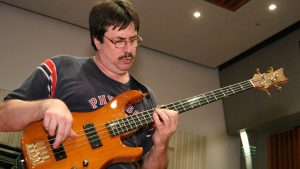 By the way, last month I talked with Miroslav Vitous (Weather Report –bass) and he told me that jazz is finished, jazz is dead, because there aren’t musical personalities like Herbie Hancock and Wayne Shorter anymore.
By the way, last month I talked with Miroslav Vitous (Weather Report –bass) and he told me that jazz is finished, jazz is dead, because there aren’t musical personalities like Herbie Hancock and Wayne Shorter anymore.
There are great musicians but they are up against a society not interested in listening to great musicians. This is called evolution. It’s not right, it’s not wrong. It’s just how things are. I understand Miroslav’s philosophy that jazz is dead. I do. I think jazz is not popular because playing is not popular as it used to be. So, it’s a sort of truth that jazz is dead in the world community, which simply needs more support from jazz musicians because jazz musicians are among the only remaining musicians who play a true way of improvisation and expression. Do you know what is entertaining in jazz? The spontaneity. The only real musicians in an improvisational and spontaneous nature come from jazz. Rock doesn’t seem to commit it or interested in it. This is just the sign of the times. So, Miroslav has a reasonable opinion, I would agree. But I would also agree that there is room for great playing and entertaining music, pop, rock and different things like that. This is what I mean to do now as a bass player.
Do you regret for your behavior when you were in Frank Zappa’s band?
So, I have a life before therapy and after therapy. Before therapy I was a guy with ego and a guy not very nice to be around sometimes. My ego was out of control and then one day I said: “I don’t like being like this” and I went to therapy. I am not shy to say this and I am not ashamed to say this but I did a lot of hard, painful work and my ego part run away and I became a nicer person. So, in the day that I was with Frank, I wasn’t a nice guy and I left Frank’s band and had an argument but today I wouldn’t be that person and I would stay with Frank and want to do my best to play in this band.
Could you imagine your life if you had never listened to The Beatles?
It’s hard to imagine my life if I never listened to The Beatles. You know, there is no argument here. They were and are the #1 group in music history.
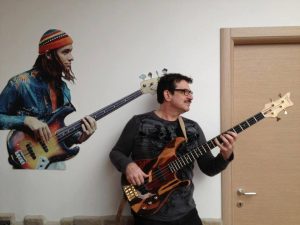 What was Jaco Pastorius like, on stage and off stage?
What was Jaco Pastorius like, on stage and off stage?
I didn’t know him very well. It was an interesting thing: Whenever I was in a city, Jaco was just down the street or we shared a lot of common friends. Most of my best friends in music were his best friends in music. But ironically I only met Jaco for two days in Los Angeles and when I managed to meet him, he was very nice with me, very friendly and we liked each other. That’s my only experience of knowing him.
There is a video on Youtube playing with Jaco.
Yes, I think we jammed at the Musician’s Institute. Correct. Of course, I am playing with a legend. He has to be recognized as the greatest bass player who ever lived.
A huge “THANK YOU” to Mr Jeff Berlin for his time and to Billy James for his valuable help.
Official Jeff Berlin website: http://jeffberlinbass.com
Official Jeff Berlin Facebook page: https://www.facebook.com/profile.php?id=100000887705597
“Jack Songs: An All-Star Tribute to Jack Bruce” Pledge Music page: http://www.pledgemusic.com/projects/jeffberlinplaysjackbruce

